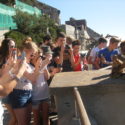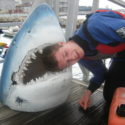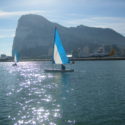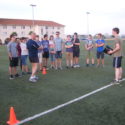Between 24 and 31 October 2014, nineteen Royal Navy CCF cadets (12 male and 7 female) and three staff members from Calday Grange Grammar School (Wirral, Merseyside) travelled to Gibraltar for an adventure training expedition. The chosen expedition name, as above, is as a result of an MOD requirement that all cadet expeditions should be headed with Northern Venturer coupled with the original name for Gibraltar, Jebel-Tarik or Tarik’s Mountain.
There were a number of desired challenges and benefits to the cadets which were considered in the planning stages of this expedition. The age range of the young people was between 14 and 16 years. A number of the cadets had not flown before and most had never travelled without their families.
From the moment that the coach left school (at 3 am!) en route for Manchester Airport, all cadets were responsible for their own passports, health cards, money, luggage and personal property. Staff had considered collecting the personal documents etc for safety, but it was decided that the learning process should extend right across the trip. In the event, all was well and no passports were lost.
At the airport, cadets were instructed to always be in groups of no less than four and were allowed to explore the shops and cafes in the departure area without supervision. The team were therefore individually responsible for checking the information screens to find out the departure gate and then to find the designated gate.
The journey to Gibraltar, care of Monarch Airlines, was on time, and we all had the pleasure of coming down the aircraft steps into a lovely sunny Gibraltar day of 25 degrees.
The party was sponsored by and were guests of the Royal Gibraltar Regiment. Accommodation and messing was provided in Devil’s Tower Camp (DTC), the main military base on the Rock, in its splendid central location about 50 metres from the runway of Gibraltar Airport.
The cadets and adults were accommodated in twin rooms with a bathroom shared between each pair of rooms. Following room allocations, we all went in to the dining hall expecting the lunch that had been pre-booked. Unfortunately, there had been a small misunderstanding and we found that Friday lunch was always a combination of late lunch and early supper – most people on the base preferring this to enable a quick exit and a long weekend. Seeing the 19 hungry-looking cadets, a very kind RAF corporal cook took it upon herself to rustle up a very decent ad hoc lunch for us all in double quick time.
Being an operational military base, newcomers to DTC are always given a variety of safety briefings and following our very welcome lunch, we heard details of how to cope with fire, how to be secure in Gibraltar and many other details. Staff were given a separate briefing by the welfare officer concerning details of how to integrate safely young people in an operational military environment.
Following this, we were able to get outside again into the wonderful sun and to pick up the pre-booked minibus (all the buses in Gib are minibuses because of the narrow roads) which took us on a trip right round the Rock. Gibraltar is tiny. It is just three and a half miles long by a mile and a half wide. Much of this is a large chunk of rock, most of which is at a precarious angle. This leaves just two square miles of habitable land on which the 30,000 inhabitants live and work. This was the first chance that the cadets had to make the acquaintance of the resident Barbary Macaques, otherwise known as the Rock Apes.
The watersports programme was the central purpose of this trip and this was conducted at the RN Joint Physical Development Unit at GunWharf. Activities included dinghy sailing, canoeing, kayaking, powerboating and water-skiing. Four full days were spent with this programme, with the cadets moving in turn in their groups from one activity to the other.
The facilities at DTC include a floodlit astro-turf sports pitch and a fully-equipped gym. We had a full evening programme of activities which included a combination of sports and an informal lecture programme concerning the historical importance of the Rock and also the on-going political situation between the UK and Spain over the status of Gibraltar.
Many thanks, from the whole party, to the Ulysses Trust for their generous support of this expedition.
Lieutenant Edward Peak, RNR, Officer in Command, Calday Grange CCF (RN Section) Expedition Leader




